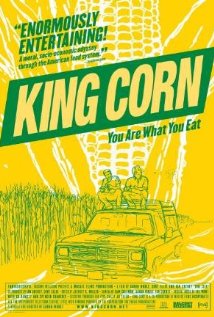For those who were shocked and amazed by the workings of the food industry in the documentary Food, Inc., there is another little known film that came out in 2006 that serves as a sort of compendium project. King Corn documents a year in the life of two Bostonians who lease an acre of land in Iowa to grow a crop of corn.
 Ironically, the college chums, a couple of likable fellows with an affinity for whiffle-ball and fast food, both had a great grandfather from the same county in Iowa. So once the two find a landowner to lease them the property and a farmer to help them plant their crop, they start to explore not only their familial roots, but the roots of the corn industry. As the corn grows, so does their search, bringing them to some truly eye-opening realizations about the US food industry.
Ironically, the college chums, a couple of likable fellows with an affinity for whiffle-ball and fast food, both had a great grandfather from the same county in Iowa. So once the two find a landowner to lease them the property and a farmer to help them plant their crop, they start to explore not only their familial roots, but the roots of the corn industry. As the corn grows, so does their search, bringing them to some truly eye-opening realizations about the US food industry.
Though a lot of the information has been touched on in films like Food, Inc. and Super Size Me as well as books like Fast Food Nation and The Omnivore’s Dilemma, King Corn delivers it from a different perspective. By telling the story from a would-be farmer’s perspective, the filmmakers are just as amazed as we are when they learn firsthand some of the inner workings of the agricultural industry. From the realization that US farmers are paid primarily through government subsidies since they often actually lose money on their crops to the fact that the majority of corn grown in Iowa is so genetically altered that it is not suitable to be eaten, even for those who have heard this information before, the film delivers it in such a compelling way that it seems fresh and consistently alarming.
The filmmakers deliver an evenhanded expose of the corn industry that doesn’t seem as scathing as so many documentaries of late have. Nevertheless, by the end, when they actually have to take their harvest to market, you can really feel their heartbreak as they sell their prize crop with no idea where it will be going or what it will be used for. Will it be one of the 20,000 acres of corn it takes just to sweeten the sodas consumed in Brooklyn, NY in one year? Will it be used to quickly fatten up cattle? Or will it be used in one of the thousands of other food products made primarily of corn?
The film points out that we now spend less of our income on food than any generation in history, and fewer of us are needed to produce that food. However, considering that we are sacrificing so much of the nutritional value to keep costs down in a society with an explosion of problems like obesity and obesity, we have to wonder if we shouldn’t reconsider our food budget. As one interviewee says of the government agricultural subsidies, “We subsidize the Happy Meals, but we don’t subsidize the healthy ones.” And yet so many of the farmers in the film insisted that if the American people demanded healthy food, they would be glad to grow it, but the current schism of quickly grown, high yield, low nutrition agriculture is going to be hard to break from. Nevertheless, considering that the impetus for the film was the realization that for the first time in history, this generation’s life expectancy is lower than the generation before, our diets need to become a higher priority.
King Corn (en) by aid4heaven
